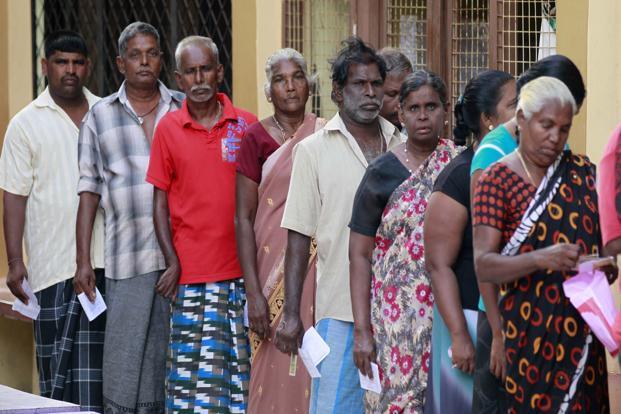Colombo elections: close challenge between three candidates
They are the outgoing president Ranil Wickremesinghe, opposition leader Sajith Premadasa and Anura Kumara Dissanayake, head of a left-wing alliance, who is seen as the favourite. At 12 noon, 30% of the eligible voters had voted. The majority of voters, 17 million in all, expressed concern about the economy.
Colombo (AsiaNews/Agencies) - A total of 17 million Sri Lankans voted today for the next president, who will be tasked with supporting the country's economic recovery after years of crisis. The results will be announced tomorrow.
According to polls, despite the presence of 38 candidates, the challenge will be between the outgoing president, Ranil Wickremesinghe, who was appointed head of government after popular protests ousted Gotabaya Rajapaksa; Anura Kumara Dissanayake for the Marxist-oriented National People's Power (NPP) coalition; and Sajith Premadasa of the opposition leader Samagi Jana Balawegaya (SJB).
'I think we desperately need change and I think many people feel the same way. To have a future, first of all the whole country must have one,' said Niroshan Perera, 36, a supporter of Dissanayake, who has emerged as favourite in the last few hours, changing the country's traditional political landscape.
The voting system in Sri Lanka requires voters to write down the names of three candidates in order of preference. If on the first ballot no candidate receives 50 per cent of the vote (a situation given as very likely by commentators), a second count is held in which the voters' second and possibly third choices are taken into account.
More than 13,000 polling stations have been set up across the country for today and 250,000 civil servants have been deployed to manage the elections, RML Rathnayake, head of the Sri Lanka Election Commission, told Reuters. Polling stations opened at 7 a.m. and will close at 4 p.m. As of 12 noon, 30% of the eligible voters had voted.
Thanks to a nearly USD 3 billion loan from the International Monetary Fund (IMF), Sri Lanka's economy has made a tentative recovery, but high costs remain the most important concern for voters. Inflation has fallen to 0.5 per cent from the peak of 70 per cent recorded in 2022 (when thousands of protesters marched on the capital, Colombo, and forced the then president Gotabaya Rajapaksa to flee and later resign) and is expected to grow slightly in 2024, but a quarter of the population of 22 million people still lives in poverty and heavy debt.
According to experts, the next president, who will be in office for five years, will have to ensure that Sri Lanka adheres to the IMF programme until 2027 to put the economy back on a stable growth path, reassuring the markets and attracting foreign investors.
12/02/2016 15:14







.png)










